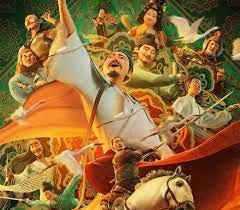This new animated movie is designed to showcase lots and lots of Tang poems, and it does an excellent job of putting the poems in a comprehensible context. I’m not going to write a review, I just want to flag up the movie and comment on some of its excellent features.
First of all, here’s a bit of general reportage on the movie, and here are two trailers. (Trailer accessible in China)
Here’s what I liked: I think it gave plausible readings of all the poems and the characters. Li Bai is at the heart of the movie, and he is depicted as a somewhat reckless force of nature, careening (and drinking) from one end of China to the other, leaving people gasping in his wake. From Li’s impact on the other writers of the time, we know that this must have been true. (I think it was only a part of Li Bai’s character - he also had a much more ironic or sardonic side - but it’s fine in a film like this to emphasise one aspect.)
Second, the movie plays the history very straight. The exception is that our hero Gao Shi appears more omnipresent and capable than history records, but the historical events happening around him seemed to be very much in order. As such, it gives us a nice view of how Chinese history really is different to European history, how the obsession with Chang’an was different from Rome, and how class was such an important factor in Tang China.
Third, it showed how poetry was used in the poets’ lives. Li Bai tries to use his poetry to impress people in power, so that they will become his patrons, or at least give him an introduction to others with influence. Friends write poems when they meet, when they party, and when they part. Travellers write poems at specific sites. And there was the Tang innovation: educated people started writing for peers they didn’t know. An interesting moment comes when Gao Shi bumps into Du Fu, who is younger than him. Du has read Gao’s poetry, which is of no immediate use to Gao, because Du Fu is in no position to help him get a job in the capital. But they bond over the shared poetry, and are able to share a moment of solidarity and friendship.
And connected to this, the movie offers an explanation of why the Tang Dynasty saw such an explosion of artistic talent. The writers around Li Bai and Gao Shi formed, for the first time, an underemployed class of educated people. With the empire at peace, wealthy families had the time to teach their children to read and write. But not all of these children received government appointments, so they started creating their own culture. (The reference if you want to know more about this is Stephen Owen - he writes big academic books, but he is an unbelievably good reader of Tang poems.)
If you want nitpicks, it’s a bit too long, and the animation is a bit shonky - the poets really look a bit like Super Mario characters. But these are nitpicks in a really strong movie that boldly juggles China’s history in the same kinds of enjoyable ways that Hollywood does with European history.
Oh, and the subtitles, including the translation of the poems, are great! They got real sinologists involved, and the subtitles are both accurate and make sense, so you can watch without knowing Chinese.
Finally, more for my own reference than anything, here is a list of the poems used in the movie. I’ll see if I can translate more of them in the next few months. If I’ve blogged them already, I’ll link them. Poems with an asterisk, I’ve translated but haven’t blogged yet.
高适 别董大
秦风 黄鸟 (from the Classic of Poetry)
李白 上李邕
王之涣 黄鹤楼*
崔颢 黄鹤楼
李白 扶风豪士歌
李白 采莲曲
王维 相思
常建 落第长安
李白 白纻词
李白 寄远
湘驿女子 题玉泉溪
孟浩然 过故人庄
高适 宋中十首
李白 黄鹤楼送孟浩然之广陵*
高适 燕歌行
李白 行路难
李白 南陵别儿童入京
李白 忆旧游寄谯郡元参军
李白 别鲁颂
高适 别刘大校书
杜甫 望岳 A View of the Sacred Mountain
贺知章 采莲曲
王昌龄 出塞*
岑参 白雪歌送武判官归京
李白 前有樽酒行
李白 梦游天姥吟留别
李白 将进酒*
李白 侠客行
李白 拟古十二首
李白 赠汪伦
西鄙人 哥舒歌 The Song of General Geshu
李白 永王东巡歌十一首
李白 早发白帝城*
李白 子夜吴歌*
王昌龄 代扶风主人答
王维 陇头吟
高适 别韦参军
李白 单父东楼秋夜送族弟沈之秦
李白 送陆判官往琵琶峡



how did you watch it? did you just buy it or? I was trying to find a free stream but could not...